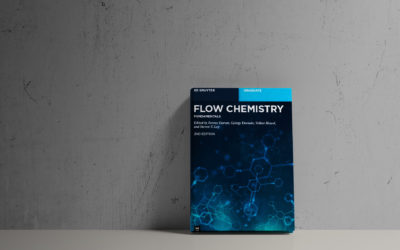The Flow Chemistry Society has named Dr. Timothy Noel from Eindhoven University of Technology as the new Editor in Chief of Journal of Flow Chemistry. He succeeds Dr. Oliver Kappe (University of Graz) who held the position of Editor in Chief for 8 years. The primary objective of the Journal of Flow Chemistry is to stimulate the development and advancement of flow chemistry for the benefit and progress of the chemistry community. The Journal provides a high-level scientific forum for rapid publication of the latest results of flow chemistry and serves as the most important information on scientific events, technology developments, products, etc. for the fast growing flow chemistry community.
Along with the installment of Dr. Timothy Noel as Editor in Chief, three new Associate Editors will join the team. This includes Dr. Jean-Christophe Monbaliu (University of Liege), Dr. Norbert Kockmann (TU Dortmund) and Dr. Shawn Collins (University of Montreal).
Statement Timothy Noel: “It is a true honor to become the new Editor in Chief. For me, Journal of Flow Chemistry has always been about connecting the different Flow Chemistry researchers in the world and to showcase the best research this exciting field has to offer. We will continue to do that with a new set of associate editors and we will launch some brand new ideas to increase further the impact of the journal.”
Statement of C. Oliver Kappe, as the former EiC: “The past 8 years have been an exciting time for me starting the Journal of Flow Chemistry in 2010, at a time when the topic was not as popular as it is today. Being an Editor one gets in contact with many scientists in the field: authors, referees, board members, publishers, etc. I do wish the new Editorial Team all the best for the future, I am sure it will be a great success!”
Statement of Ferenc Darvas as the President of the Flow Chemistry Society: “The Journal of Flow Chemistry is the first and most important periodical of the field of flow chemistry and emerging area which was listed as the 4th most important field in IUPAC’s compilation on Ten Chemical Innovations That Will Change Our World. The Flow Chemistry Society together with its members is enthusiastic to continue its support of the Journal.”
Statement of Akadémiai Kiadó: “The Journal of Flow Chemistry has been a success story in the Journal portfolio of our publishing house. Launching a journal in a small field is always a risky venture, but after only two years of its existence it was accepted for inclusion to the Science Citation Index and since then it has been highly read and cited, as proven by its impact factor. With Springer as co-publisher the journal now reaches an even wider audience, and the new Editor-in-Chief together with the new Associate Editors and the renewed editorial boards have our full confidence and support.”
“In recent years the field of flow chemistry has rapidly developed and so has the Journal. Being part of the success story of the “Journal of Flow Chemistry” as co-publisher of Akadémiai Kiadó for two years now, we look forward to working with the new editorial team to continue the success of this Journal”, explained Christiane Brox, associate editor at Springer.



